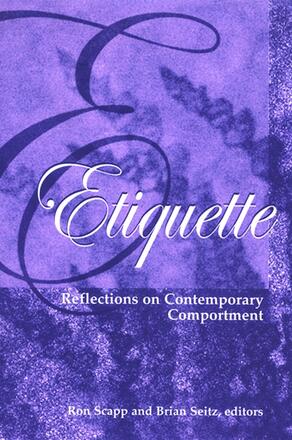
Etiquette
Reflections on Contemporary Comportment
Alternative formats available from:
Brings etiquette into dialogue with ethics.
Description
Etiquette, the field of multifarious prescriptions governing comportment in life's interactions, has generally been neglected by philosophers, who may be inclined to dismiss it as trivial, most specifically in contrast to ethics. Philosophy tends to grant absolute privilege to ethics over etiquette, placing the former alongside all of the traditional values favored by metaphysics (order, truth, rationality, mind, masculinity, depth, reality), while consigning the latter to metaphysics' familiar, divisive list of hazards and rejects (arbitrariness, mere opinion, irrationality, the body, femininity, surface, appearance). Addressing a broad range of subjects, from sexuality, clothes, and cell phones to hip-hop culture, bodybuilding, and imperialism, the contributors to Etiquette challenge these traditional values—not in order to favor etiquette over ethics, but to explore the various ways in which practice subtends theory, in which manners are morals, and in which ethics, the practice of living a good life, has always depended upon the graceful relations for which etiquette provides the armature.
Ron Scapp is Professor of Humanities and Teacher Education at the College of Mount Saint Vincent. He is the author of Teaching Values: Critical Perspectives on Education, Politics, and Culture. Brian Seitz is Associate Professor of Philosophy at Babson College. He is the author of The Trace of Political Representation and coeditor (with Ron Scapp) of Eating Culture, both also published by SUNY Press.
Reviews
"…the essays are great fun and … show the variety of rules for society's subcultures. " — CHOICE
"There have been many books on civility in recent years, and of course there are popular manuals of etiquette, but I don't know of any other book that connects the supposedly larger and deeper questions of the polis with matters of everyday comportment. Perhaps the greatest intellectual contribution this book makes is to show connections where one would have not previously looked for them. Given how absent the question of class has been from much social theory, political philosophy, and even feminism and critical race theory, the essays focusing on how much the norms of 'polite society' have to do with reinforcing class structures are refreshing. " — Bill Martin, DePaul University